Every day, decisions are made or delayed based on the information at hand. Yet for many enterprises in 2025, the right information often feels just out of reach. Employees spend hours digging through scattered systems, while customers either grow dissatisfied or walk away from interactions when answers don’t come fast enough. The result? Missed opportunities, disengaged teams, and experiences that fall short of expectations.
The landscape has changed. Customers now demand instant, personalized, and contextually relevant experiences, while employees expect seamless access to the knowledge they need to act quickly and with confidence. Traditional search tools, static dashboards, and fragmented knowledge bases can no longer keep up. Businesses that fail to close this gap risk losing productivity, loyalty, and a competitive edge.
This is where AI-powered search transforms the narrative. It doesn’t just retrieve information; it understands intent, interprets natural language, and delivers precise answers in the right context and at the right moment. Think of it as a compass for your enterprise, cutting through silos, surfacing what matters instantly, and guiding every team toward smarter action.
AI-powered search isn’t just another tool; it’s the engine behind faster decisions, empowered employees, and customer experiences that truly connect. In the sections that follow, we’ll explore exactly what it is, how it works, and why it has become indispensable for enterprises looking to thrive in an era of accelerating expectations.
What is AI-powered search
AI-powered search is an intelligent system that transforms how organizations find, understand, and act on information. Unlike traditional keyword-based search, which retrieves results based only on exact terms, AI-powered search comprehends natural language, interprets intent, and adapts to user behavior, delivering answers that are precise, relevant, and actionable.
At its core, it combines natural language processing (NLP), large language models (LLMs), machine learning (ML), and semantic understanding to interpret queries typed, spoken, or implied, and it works across all data structured (databases, ERP), unstructured (emails, documents), and dynamic (conversations, support logs). This ensures that employees, customers, and partners can access the right information exactly when they need it, without friction or wasted effort.
What sets AI-powered search apart is its adaptive intelligence. Each interaction helps the system learn and improve, refining relevance, breaking down silos, and scaling knowledge across the enterprise. By instantly connecting people with the right information, regardless of its location, AI-powered search empowers organizations to make informed decisions, act with confidence, and drive meaningful outcomes.
In essence, AI-powered search is more than a retrieval tool; it is a foundation for clarity, agility, and intelligent action, enabling organizations to operate smarter, respond faster, and deliver experiences that truly resonate.
Why is there a need for AI-powered search in 2025
In 2025, enterprises compete in an environment where speed and experience define success. Customers expect instant, personalized interactions, while employees need frictionless access to knowledge to stay productive. Traditional search tools can’t meet these demands, leaving gaps, delays, and frustrations. AI-powered search fills this void by connecting scattered information, simplifying everyday work, and enabling the seamless experiences that set industry leaders apart.
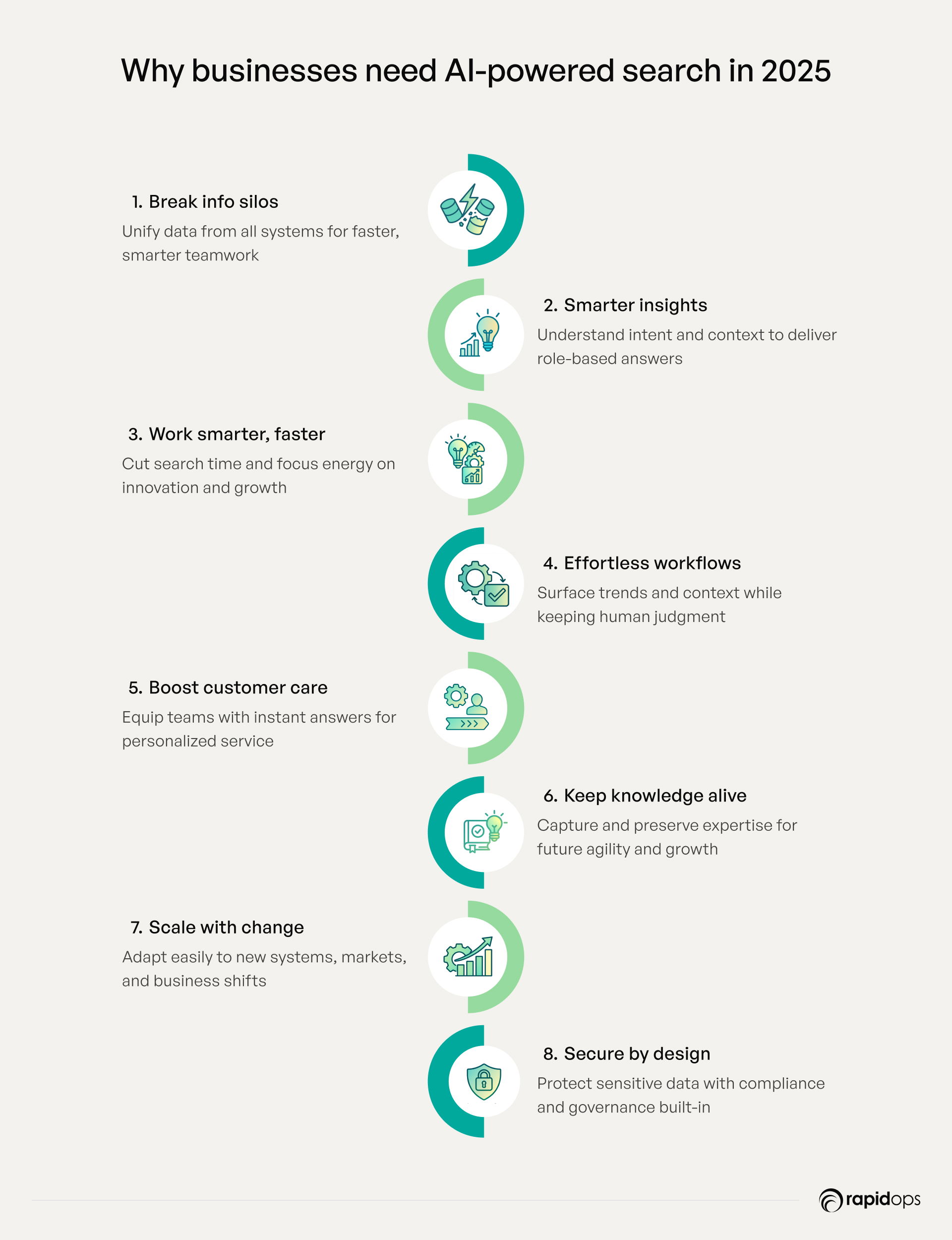
1. Unlock enterprise-wide productivity by connecting fragmented information
Knowledge often resides in silos across CRM, ERP, collaboration platforms, and cloud systems. AI-powered search bridges these divides, providing a unified interface that enables employees to locate insights instantly. By consolidating access and eliminating redundancy, organizations unlock hidden productivity across teams and departments, ensuring every action is informed and efficient.
2. Deliver context-aware, actionable insights
AI-powered search goes beyond keywords to interpret intent, semantics, and business context. Employees receive insights tailored to their role and workflow, enabling them to act efficiently on relevant information. This accelerates operational tasks without substituting strategic judgment, allowing teams to focus on higher-value contributions.
3. Transform time spent searching into strategic output
Information retrieval consumes significant organizational time. AI-powered search delivers precise results instantly, reducing wasted effort and allowing teams to focus on problem-solving, innovation, and revenue-generating activities. By converting search hours into productive output, enterprises gain measurable operational and financial benefits.
4. Streamline daily operations while supporting human judgment
AI-powered search organizes information, highlights relevant trends, and surfaces context for routine workflows. Teams can execute daily tasks more efficiently and accurately while maintaining control over decision-making. This ensures operational efficiency without replacing human oversight or strategic thinking.
5. Enhance customer experience with intelligent support
Frontline teams access real-time, accurate insights through AI-powered search, enabling them to respond rapidly and deliver personalized service. Customers benefit from consistent, high-quality interactions, while employees are freed to focus on complex or high-value activities, thereby reinforcing both operational efficiency and customer satisfaction.
6. Preserve institutional knowledge and expertise
AI-powered search codifies and archives organizational knowledge, capturing expertise embedded in employees and systems. Enterprises reduce onboarding friction, safeguard intellectual capital, and maintain continuity across workforce transitions, ensuring that critical knowledge remains accessible and actionable.
7. Scale and adapt to evolving business needs
Modern enterprises face growing complexity and dynamic market demands. AI-powered search scales effortlessly, integrating new systems, processes, and technologies. This flexibility ensures operational efficiency and agility, allowing businesses to pivot or expand without disruption.
8. Maintain enterprise-grade security, compliance, and governance
AI-powered search incorporates robust security, access controls, and compliance measures to ensure the protection of data. Organizations can confidently leverage intelligent search, protecting sensitive information while maintaining regulatory adherence, stakeholder trust, and governance standards.
How AI-powered search works
AI-powered search is transforming how enterprises access and utilize information to drive day-to-day operational efficiency and deliver an enhanced customer experience. Unlike traditional search systems, which rely on exact keywords and often return fragmented or irrelevant results, AI-powered search understands context, intent, and relevance, enabling employees to perform routine tasks faster and more accurately.
1. Natural language processing
At its core, AI-powered search leverages natural language processing (NLP) to understand queries in a manner similar to how a human would. Employees can ask questions in everyday language, and the system interprets intent and context, delivering precise results. This reduces time spent navigating multiple systems and helps teams accomplish operational tasks efficiently.
2. Semantic search
Semantic search allows AI to capture the meaning behind queries, recognizing relationships between terms, synonyms, and concepts. Employees no longer need to guess the exact phrasing to find information. This capability breaks down knowledge silos, ensures accuracy, and streamlines routine workflows, such as retrieving documents, product information, or support resources.
3. Machine learning
Machine learning continuously refines AI-powered search based on user interactions and organizational priorities. Over time, the system improves at surfacing the most relevant results for daily operational tasks, reducing repetitive searching, and ensuring that employees spend more time executing work rather than searching for information.
4. Personalization engines
AI search tailors results based on user roles and context, ensuring that every employee sees information directly relevant to their day-to-day responsibilities. For instance, support staff can instantly access customer histories, marketing teams find campaign assets quickly, and operations teams retrieve process documents efficiently. This reduces cognitive load and enhances productivity.
5. Enterprise integration
AI-powered search works across multiple enterprise platforms, CRM, ERP, knowledge bases, collaboration tools, and cloud storage, breaking down silos. Employees gain a unified view of information, eliminating the need to switch between applications, which enables smoother workflows and faster task execution.
6. Continuous learning and adaptability
The system constantly learns from usage patterns, emerging terminology, and operational trends. This ensures that AI search remains aligned with everyday work requirements, maintaining accuracy and relevance as workflows evolve, and helps employees execute tasks with minimal friction.
How does AI-powered search differ from traditional search
In modern enterprises, information is vast, unstructured, and distributed across multiple systems. Traditional search relies on literal keyword matching, often returning fragmented or irrelevant results, forcing employees to manually sift through multiple platforms.
AI-powered search, by contrast, leverages advanced intelligence to understand intent, context, and conceptual relationships, delivering precise, role-specific insights in real time. This transforms everyday workflows by enabling teams to find relevant information effortlessly, accelerate routine tasks, enhance customer interactions, and maintain operational efficiency.
| Feature | Traditional search | AI-powered search |
| Query Interpretation | Literal keyword matching | Understands intent, context, and phrasing variations |
| Conceptual understanding | Limited to exact terms | Recognizes synonyms, relationships, and patterns |
| Role-aware delivery | Same results for all users | Tailors results by role, workflow, and past interactions |
| Enterprise integration | Often siloed | Connects ERP, CRM, collaboration, and knowledge repositories |
| Adaptability | Static results | Learns continuously from user behavior and changing workflows |
| Operational efficiency | Manual aggregation and filtering | Instant, context-aware results |
| Customer experience | Slow and inconsistent | Real-time contextual insights |
| Scalability | Performance decreases with data growth | Dynamic scaling across systems |
AI-powered search redefines how enterprises navigate information, moving beyond literal keyword matching to deliver context-aware, role-specific insights instantly. By streamlining daily workflows, reducing operational friction, and enabling faster and more accurate customer responses, it transforms routine tasks into strategic enablers of efficiency, productivity, and measurable business impact throughout the organization.
How AI-powered search is transforming operational efficiency
Every day, employees navigate a maze of emails, databases, and collaboration tools just to locate the information they need. AI-powered search cuts through this clutter, delivering precise, context-aware insights instantly, streamlining workflows, and enabling teams to complete tasks more quickly and efficiently.
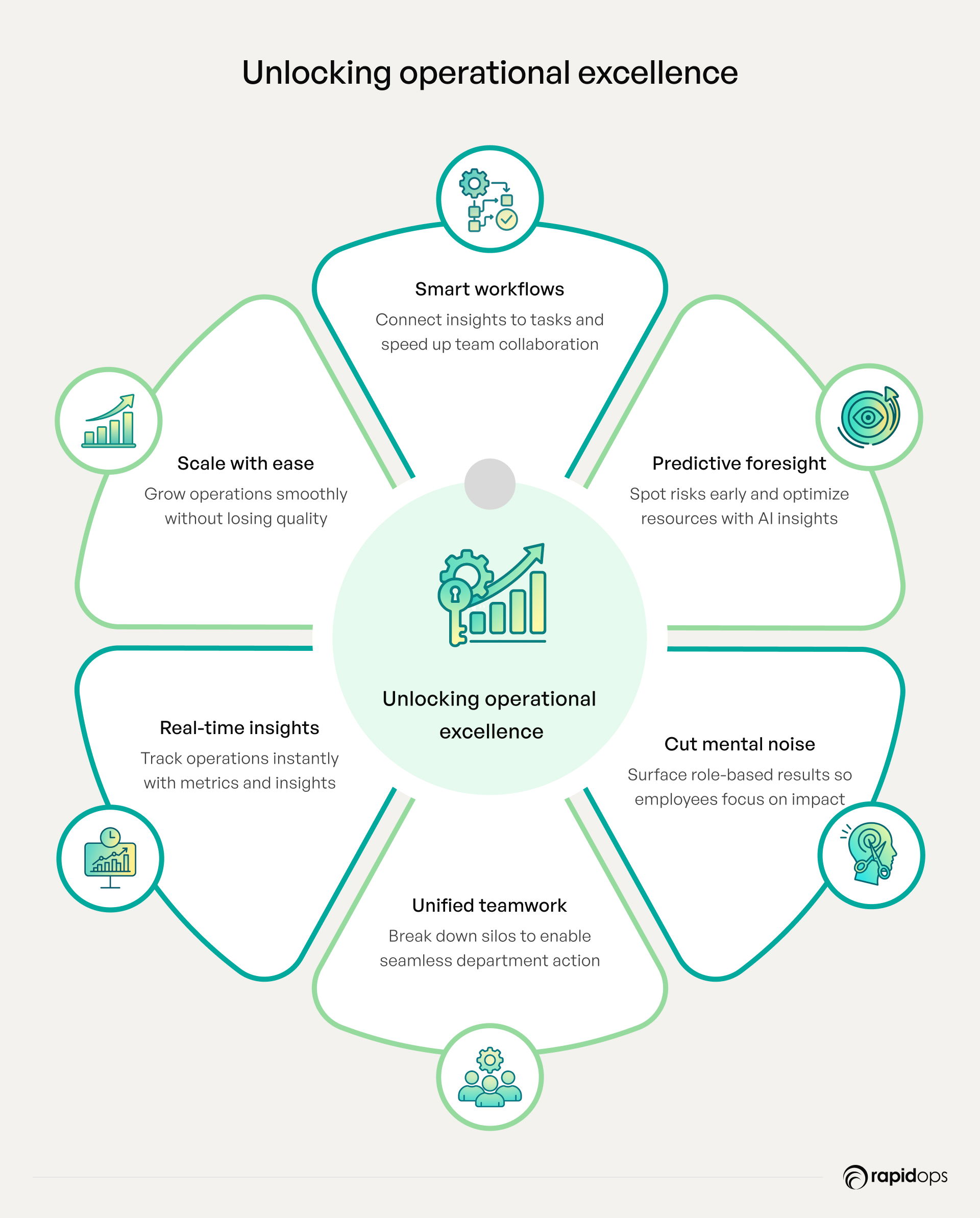
1. Orchestrating workflows with intelligence
AI-powered search identifies relevant information across multiple platforms in real time, connecting insights to the specific workflow stage. Teams no longer waste time hunting for resources; instead, they receive intelligent prompts and actionable suggestions that streamline approvals, task handoffs, and cross-departmental collaboration.
2. Operational foresight through predictive insights
Beyond retrieving information, AI-powered search anticipates operational needs. By analyzing historical patterns and current trends, it highlights potential bottlenecks, predicts resource constraints, and suggests proactive interventions. This foresight enables managers to allocate resources strategically and mitigate risks before they impact productivity.
3. Reducing cognitive load for employees
AI-powered search filters noise from critical information, presenting only what is essential for each role. By delivering personalized, context-specific results, employees can focus on high-value tasks rather than navigating redundant systems or sifting through irrelevant data, driving operational efficiency and morale simultaneously.
4. Enabling seamless cross-functional coordination
By integrating with ERP, CRM, collaboration platforms, and knowledge repositories, AI-powered search eliminates silos. Teams gain a single source of truth, ensuring consistent actions across departments, accelerating project timelines, and improving alignment between operational and strategic objectives.
5. Real-time performance insights
AI-powered search surfaces operational metrics alongside actionable recommendations. Leaders can monitor ongoing activities, detect inefficiencies, and intervene immediately, creating a transparent and accountable operational environment that drives measurable improvements.
6. Supporting scalable operations
As enterprises grow, AI-powered search scales effortlessly, supporting expanding teams, distributed operations, and increasingly complex workflows. Maintaining consistent operational efficiency across the organization ensures that growth never comes at the cost of speed or quality.
Why AI-powered search is redefining customer experience
In 2025, customer expectations have evolved beyond speed; they demand interactions that are personalized, context-aware, predictive, and seamless across all touchpoints. Traditional search systems often deliver fragmented or irrelevant results, creating friction and missed opportunities for engagement. AI-powered search transforms this landscape, enabling organizations to provide instant, relevant, and actionable insights, turning each interaction into a strategically valuable engagement.
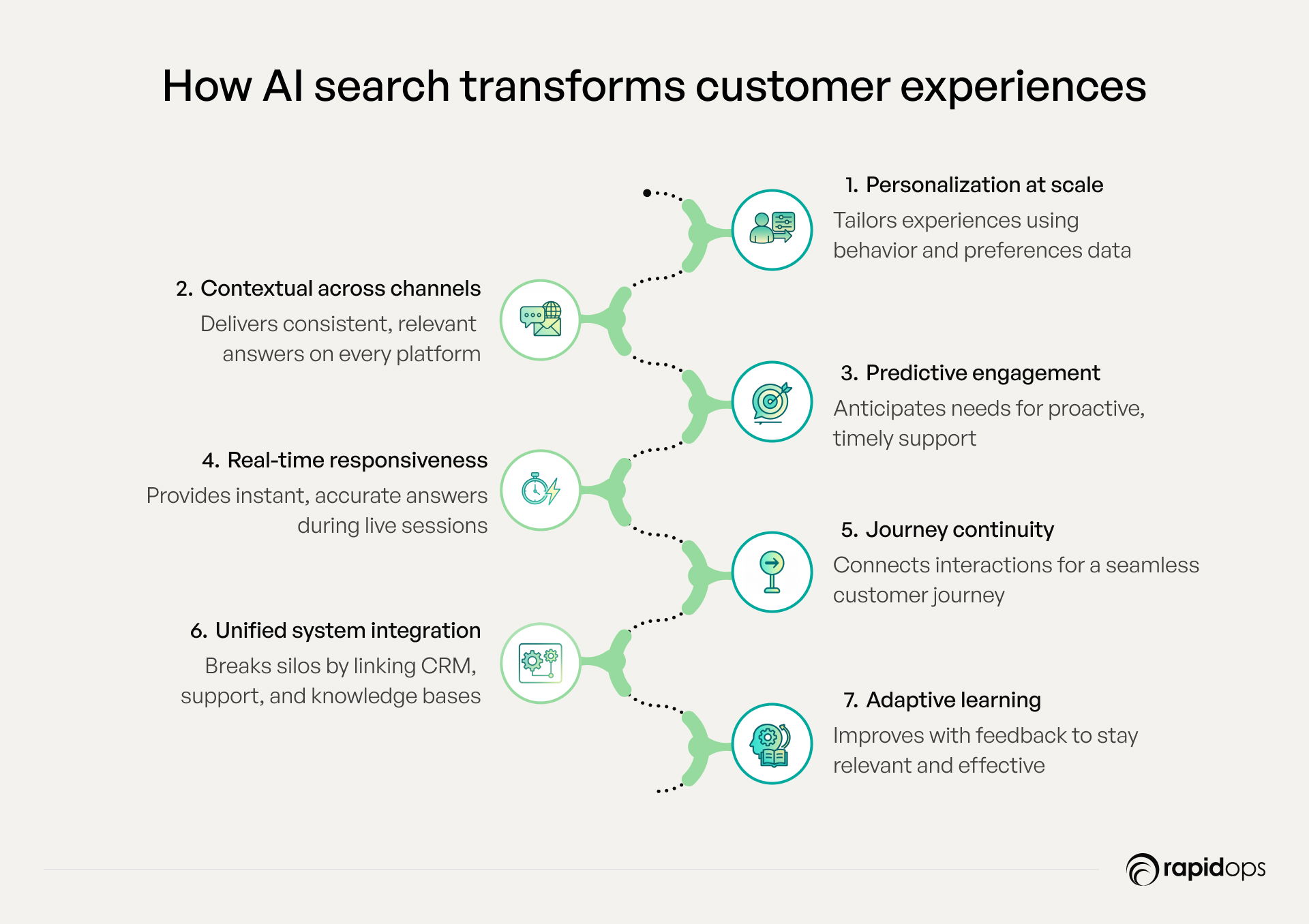
1. Personalization at scale
AI-powered search delivers highly tailored experiences by analyzing historical interactions, behavior patterns, and customer preferences. Each customer receives results aligned with their journey stage, context, and objectives. This personalization drives deeper engagement, satisfaction, and loyalty, ensuring that interactions are meaningful and impactful.
2. Contextual understanding across channels
AI interprets intent, context, and nuance, not just keywords. Whether customers interact via chat, voice, web, or mobile, AI ensures consistent, relevant responses across channels, providing a seamless experience that strengthens trust and customer confidence.
3. Predictive insights for proactive engagement
Beyond responding, AI anticipates customer needs by analyzing patterns, historical data, and emerging trends. This allows organizations to proactively suggest solutions, prevent issues, and highlight opportunities for engagement, reducing wait times and enhancing first-contact resolution.
4. Real-time responsiveness
Modern AI search delivers instant, actionable insights during live interactions, enabling support agents or digital interfaces to provide timely, accurate answers. This immediacy enhances experience, resolves queries faster, and ensures customers feel valued at every touchpoint.
5. Customer journey continuity
AI-powered search maintains a cohesive understanding of the customer journey, connecting interactions across multiple touchpoints and systems. By preserving context and history, it ensures each interaction feels continuous and personalized, reducing repetition and improving overall satisfaction.
6. Seamless integration with enterprise systems
By connecting CRM, knowledge bases, support platforms, and digital interfaces, AI search creates a unified ecosystem of customer intelligence. This eliminates silos, ensures accurate information, and enables rapid, informed responses, enhancing operational efficiency alongside the customer experience.
7. Feedback-driven improvement and adaptive learning
AI-powered search continuously learns from customer feedback, engagement patterns, and evolving behaviors. This adaptive intelligence ensures search results and interactions improve over time, remaining increasingly relevant, accurate, and aligned with dynamic customer expectations.
By leveraging personalization, predictive insights, real-time responsiveness, and journey continuity, AI-powered search transforms customer experience, delivering faster resolutions, deeper engagement, and consistent value that drives loyalty, retention, and competitive advantage.
Where AI-powered search is driving real impact in the enterprise
Across today’s enterprises, AI-powered search is emerging as a catalyst for transformation. By connecting fragmented data, surfacing context-rich insights, and enabling precision access to knowledge, it drives impact where traditional systems fall short, strengthening collaboration and elevating operational efficiency.
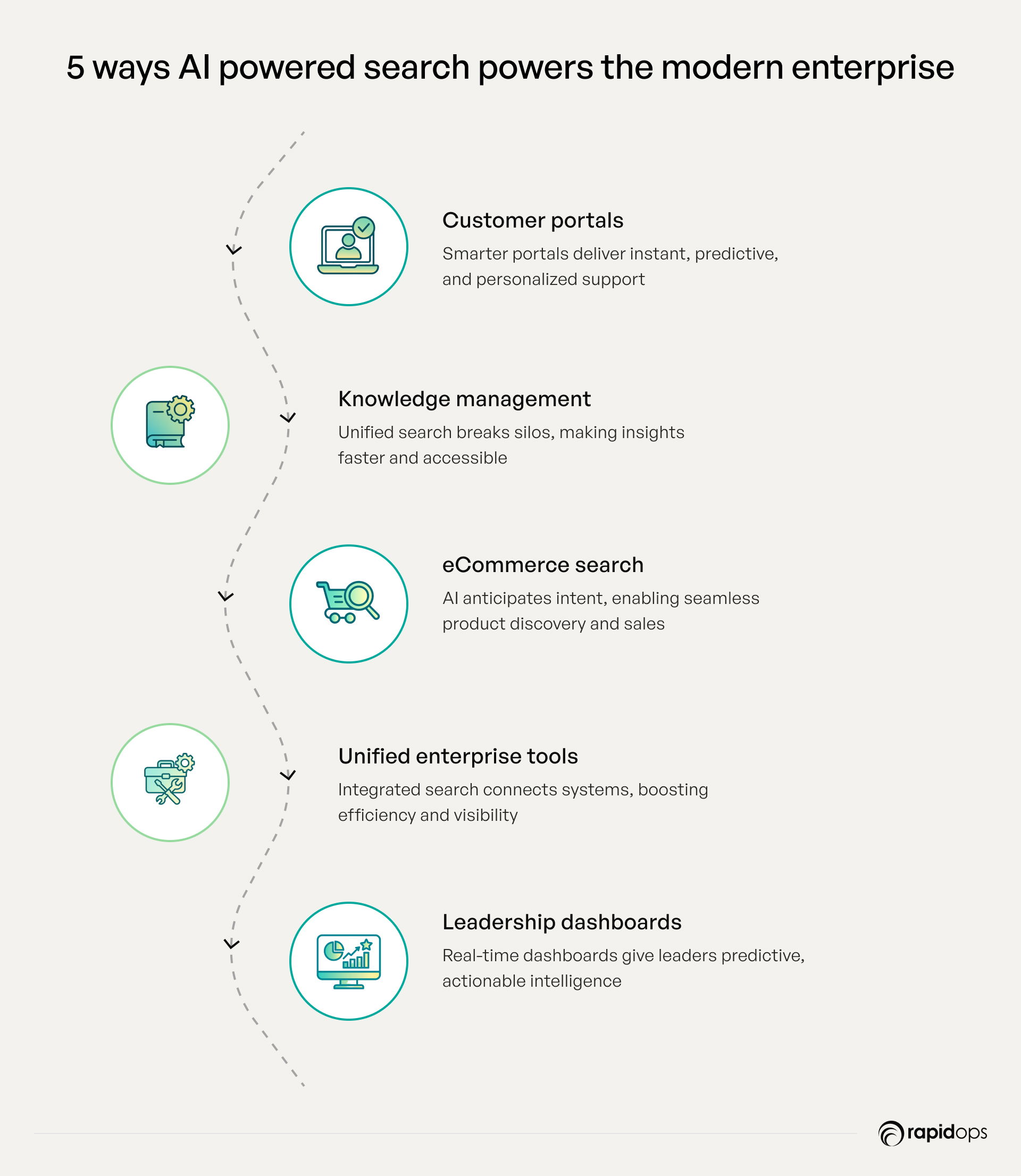
1. Customer portals
Modern customer portals are often hindered by fragmented data and complex queries, which limit user satisfaction and engagement. AI-powered search transforms these portals by leveraging predictive search and personalized recommendations, delivering context-aware results instantly. Customers experience faster resolutions, guided interactions, and consistent self-service support. This not only enhances customer experience but also drives loyalty, reduces support costs, and positions enterprises for measurable competitive advantage. Executives gain real-time insight into engagement trends, enabling them to make proactive business decisions.
2. Knowledge management
Enterprises struggle with siloed knowledge across documents, intranets, and collaboration platforms, causing inefficiencies and missed opportunities. AI-powered unified enterprise search consolidates structured and unstructured data, applying semantic understanding to retrieve insights based on intent, not just keywords. Teams access relevant expertise immediately, accelerating decision-making, reducing duplication, and enhancing operational efficiency. Leaders benefit from an agile knowledge ecosystem that fuels innovation and ensures strategic alignment across business units.
3. eCommerce Search
Online commerce requires fast and accurate product discovery to maximize conversions and revenue. AI-powered search enhances eCommerce platforms by anticipating user intent, recommending products, and applying predictive search logic to surface relevant offerings even with vague queries. This enhances the customer experience, reduces purchase cycles, and drives a higher average order value. Retail executives can track behavioral insights to refine merchandising strategies, inventory planning, and personalized marketing campaigns.
3. Unified search across tools
Enterprises often rely on multiple, disconnected tools, such as CRM systems, ERP systems, and collaboration platforms, leading to fragmented visibility. AI-powered search integrates across all systems, providing a single source of truth for employees. Users gain immediate access to relevant data, insights, and context across tools, boosting operational efficiency and enabling faster, informed decision-making. Leaders can monitor enterprise-wide information flows, identify gaps, and implement strategic initiatives with confidence.
4. Leadership dashboards
Data-driven leadership requires concise, actionable intelligence. AI-powered search powers dynamic dashboards that surface critical metrics, trends, and insights from across the enterprise. By combining predictive insights with role-based personalization, executives receive timely and relevant updates in real-time. This drives more informed strategic decisions, enhances organizational agility, and strengthens the enterprise’s ability to anticipate market shifts and operational challenges.
What are the key considerations before adopting AI-powered search
Before adopting AI-powered search, enterprises must evaluate alignment with business goals, data readiness, integration complexity, user experience, scalability, and vendor expertise, ensuring that the technology delivers measurable efficiency, informed decision-making, and a long-term strategic advantage.
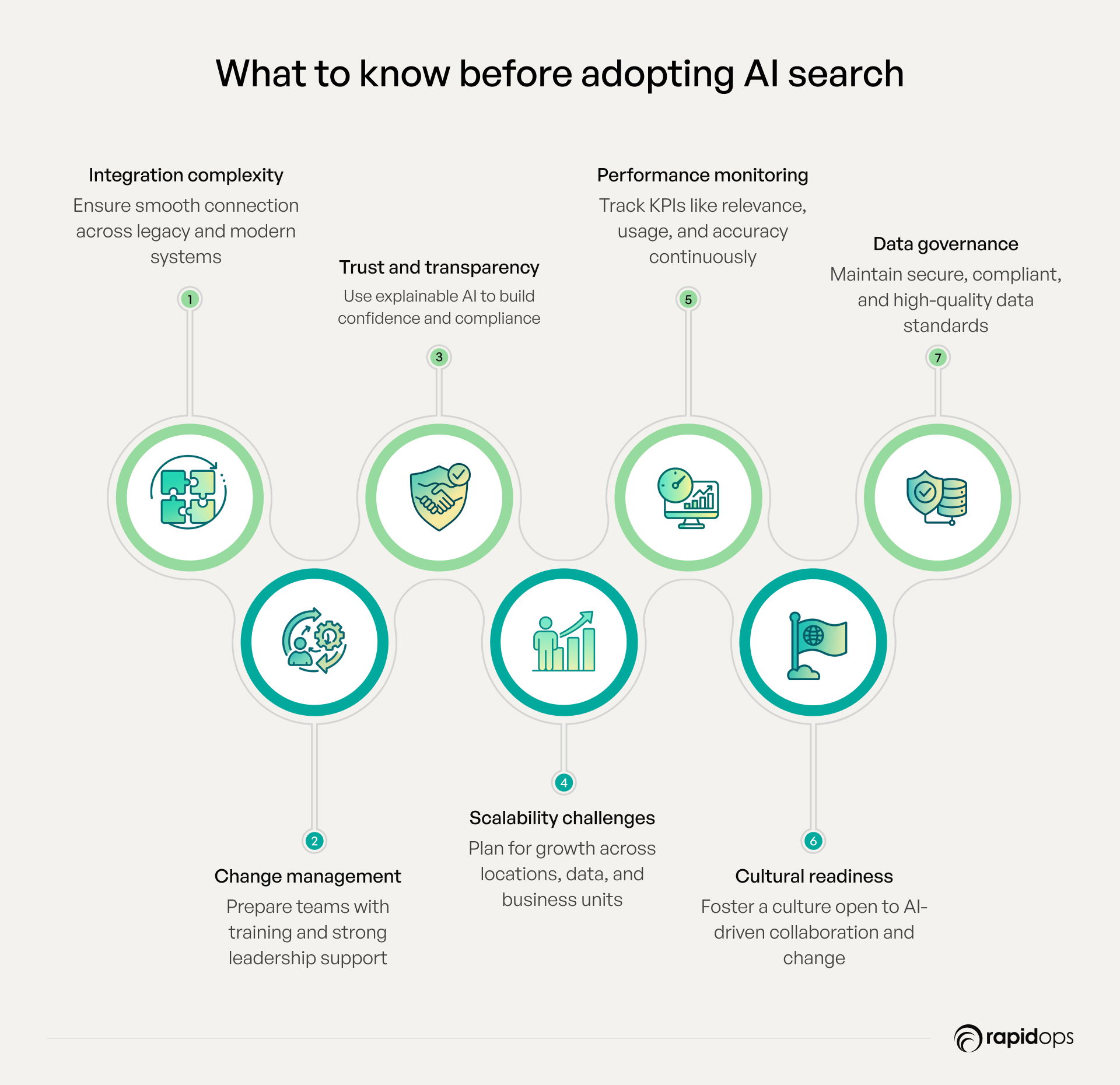
1. Integration complexity
Enterprises operate with a mix of legacy and modern systems, including ERP, CRM, knowledge bases, and cloud platforms. Seamless integration ensures AI-powered search connects structured and unstructured data, creating a unified enterprise intelligence ecosystem. Failing to plan integration can result in silos, fragmented insights, and lower adoption rates.
2. Change management
Organizational readiness determines adoption success. Training programs, executive sponsorship, and stakeholder engagement help employees embrace AI-powered search tools. Effective change management reduces friction, accelerates adoption, and ensures teams leverage AI-driven insights to enhance operational efficiency and customer experience.
3. Trust and transparency
Explainable AI, auditability, and accountable algorithms are essential for enterprise confidence. Transparent AI operations help mitigate risks, ensure compliance, and build trust across teams and stakeholders, while reinforcing strategic reliance on AI-generated insights.
4. Scalability challenges
AI-powered search must adapt as the enterprise grows across geographies, business units, and data volumes. Scalable architectures, flexible deployment models, and performance monitoring ensure the system supports future expansion without compromising efficiency or accuracy.
5. Performance monitoring
Continuous evaluation of search relevance, accuracy, and adoption metrics enables enterprises to refine AI models, anticipate emerging needs, and improve decision-making speed. Monitoring KPIs like query success rates, user engagement, and task completion ensures measurable business impact.
6. Cultural readiness
An enterprise culture receptive to AI adoption fosters collaboration, innovation, and data-driven decision-making. Encouraging cross-functional engagement, rewarding AI-driven successes, and promoting digital literacy ensures AI-powered search achieves its full potential.
7. Data governance
Secure, compliant, and reliable data is foundational. AI-powered search relies on high-quality datasets to provide predictive insights and personalized results. Establishing robust governance policies ensures data integrity, regulatory compliance, and traceability, enabling informed and accountable decision-making.
Empowering smarter decisions and growth with AI-powered search
As you’ve explored, enterprises today face an overwhelming volume of data scattered across systems, slowing decisions and impacting both operational efficiency and customer satisfaction. AI-powered search transforms this complexity into clarity, delivering actionable insights, predictive intelligence, and personalized experiences that enable teams to act confidently and strategically.
At Rapidops, we’ve partnered with organizations across retail, manufacturing, and distribution to build and implement AI-powered search solutions that turn data into measurable business outcomes. Our experience ensures solutions are tailored, scalable, and aligned with real enterprise priorities, helping leaders accelerate decisions, optimize operations, and elevate customer experiences.
If your organization is ready to scale success and gain a competitive edge, schedule a free appointment with one of our AI experts. Discover how AI-powered search can simplify operations, enhance efficiency, and drive superior business performance across your enterprise.
Frequently Asked Questions
How does semantic search improve AI-powered results?
Semantic search enables AI-powered systems to understand the meaning behind queries rather than relying solely on keywords. By interpreting context, synonyms, and intent, it delivers highly relevant results even when search terms vary. This reduces information fragmentation, accelerates decision-making, and ensures employees access actionable insights across structured and unstructured enterprise data. For organizations, semantic search strengthens operational efficiency, enhances customer interactions, and transforms enterprise knowledge into a strategic asset.
How does AI-powered search influence enterprise ROI?
AI-powered search directly impacts ROI by streamlining workflows, reducing time spent on information retrieval. When employees can access insights faster, operational costs decrease, revenue opportunities increase, and customer satisfaction rises. By integrating predictive intelligence and personalization, enterprises can convert data into measurable outcomes, turning information management into a tangible financial advantage. The ROI manifests in faster project cycles, improved cross-functional collaboration, and better resource allocation.
What is the difference between AI-powered and cognitive search?
AI-powered search leverages machine learning, natural language processing, and predictive analytics to deliver contextual, personalized, and adaptive results. Cognitive search, while overlapping in some areas, primarily focuses on understanding unstructured content and extracting insights using reasoning and pattern recognition. AI-powered search integrates these capabilities across enterprise systems, continuously learning from user behavior to optimize performance, whereas cognitive search tends to emphasize information discovery without full operational integration.
Can AI-powered search improve manufacturing process optimization?
Yes. In manufacturing, AI-powered search consolidates data from production logs, IoT sensors, quality reports, and supply chain systems. It identifies patterns, predicts bottlenecks, and provides actionable insights in real time. By enabling engineers and operations teams to find critical information quickly, AI search enhances equipment utilization, minimizes downtime, and accelerates decision-making, ultimately improving throughput, reducing operational costs, and supporting enterprise-wide digital transformation initiatives.
How does AI-powered search mitigate risks of biased search results?
AI-powered search incorporates algorithms that monitor and reduce bias by continuously analyzing query patterns, result rankings, and data sources. Transparent governance frameworks, coupled with feedback loops and adaptive learning, ensure search results remain equitable and accurate. Enterprises can implement role-based filters, audit trails, and oversight mechanisms, guaranteeing decisions derived from AI search are unbiased, compliant, and aligned with strategic objectives, thereby preserving trust and reliability in critical business operations.
How can small enterprises benefit from AI-powered search?
Small enterprises can leverage AI-powered search to gain efficiency comparable to larger organizations. By providing employees with instant, context-aware access to relevant information, AI reduces time spent on routine tasks, minimizes operational friction, and enables more responsive customer interactions. Even with limited resources, small enterprises can accelerate workflows, unlock hidden productivity, and compete effectively by maximizing the value of available data.
Can AI-powered search integrate seamlessly with existing enterprise systems?
Yes. Modern AI-powered search is designed to integrate with ERPs, CRMs, collaboration platforms, and knowledge management systems. This seamless integration ensures that employees can access critical insights directly within the tools they use daily, eliminating manual cross-referencing or context switching. The result is streamlined operations, faster task execution, and improved productivity across departments.
How quickly can organizations implement AI-powered search at scale?
Implementation speed depends on enterprise readiness, existing data architecture, and integration complexity. Modern AI-powered search solutions offer pre-built connectors, scalable cloud infrastructure, and role-based personalization, allowing rapid deployment. Organizations can begin realizing operational efficiency gains and improved information access within weeks, while iterative refinements and continuous learning ensure long-term adaptability and scalability.
Can AI-powered search adapt to evolving enterprise data and user behavior?
Absolutely. AI-powered search continuously learns from user interactions, emerging trends, and changing organizational priorities. Its adaptive intelligence ensures search results remain relevant, accurate, and contextually aligned with everyday tasks. This dynamic evolution enables enterprises to maintain operational efficiency, improve employee effectiveness, and respond to shifting business requirements without manual intervention or system downtime.

Rahul Chaudhary
Content Writer
With 5 years of experience in AI, software, and digital transformation, I’m passionate about making complex concepts easy to understand and apply. I create content that speaks to business leaders, offering practical, data-driven solutions that help you tackle real challenges and make informed decisions that drive growth.
What’s Inside
- What is AI-powered search
- Why is there a need for AI-powered search in 2025
- How AI-powered search works
- How does AI-powered search differ from traditional search
- How AI-powered search is transforming operational efficiency
- Why AI-powered search is redefining customer experience
- Where AI-powered search is driving real impact in the enterprise
- What are the key considerations before adopting AI-powered search
- Empowering smarter decisions and growth with AI-powered search

Let’s build the next big thing!
Share your ideas and vision with us to explore your digital opportunities
Similar Stories
- AI
- 4 Mins
- September 2022

- AI
- 9 Mins
- January 2023


Receive articles like this in your mailbox
Sign up to get weekly insights & inspiration in your inbox.

